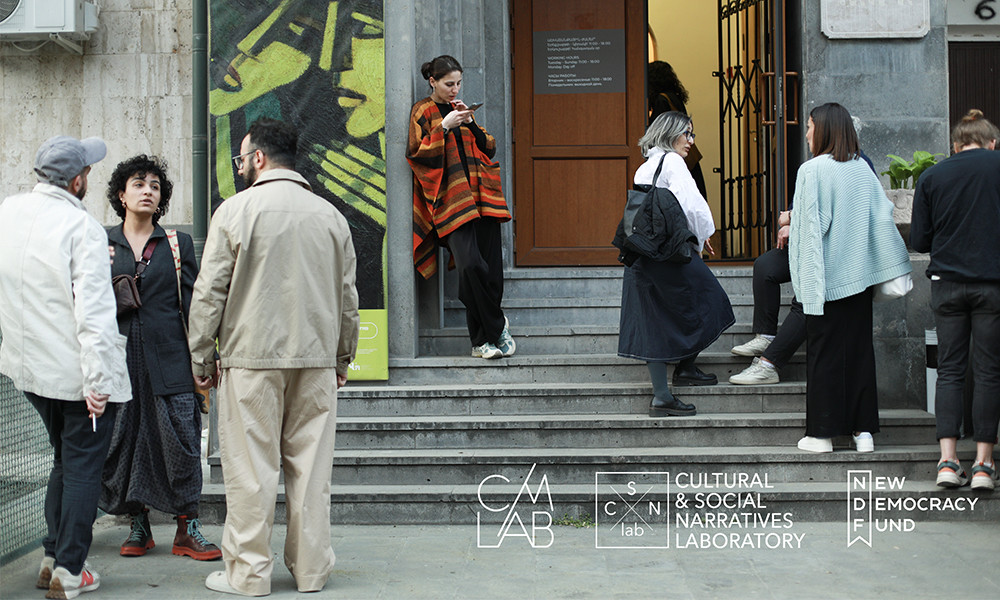This year the Re-Lentus annual event, aimed at mainstreaming female artists and cultural practitioners and establishing Armenian-Georgian cultural dialogue, revolved around literature. The "Cultural and Social Narratives Laboratory" (CSN Lab) chose the Giotto Museum as the venue for the event as it commemorates the Armenian-Georgian cultural dialogue. This site was once home to the Georgian poet and artist Diana Ukleba and the Armenian artist Gevorg Grigoryan, renowned for his portraits, landscapes, still lifes, and drawings.
In the framework of the "Re-Lentus: Literature" event, Arpine Saribekyan, the head of the Giotto Museum, who plays an instrumental role in the centre's activities and in forging new connections with Georgian cultural practitioners and institutions, conducted a tour for guests and participants. Mrs. Saribekyan stressed that the museum showcases artworks by both Giotto and Diana, underscoring its potential to serve as a space for cultural dialogue between Armenian and Georgian cultural practitioners, artists, and researchers.
The "Re-Lentus: Literature" event commenced with a panel discussion, graced by esteemed guests from Georgia. This provided the Armenian literary and reading community with the opportunity to familiarise themselves with the literary endeavours and insights of writers Ana Kordzaya-Samadashvili, Tamta Melashvili, and Gvantsa Jobava, while also engaging in dialogue by posing questions to them.
Writer, translator, and lecturer at the Ilia State University, Ana Kordzaya-Samadashvili, delved into her literary career, placing particular emphasis on the taboos that arose in the early 2000s, many of which persist in Georgian society today. Ana's writings on sexuality are often met with harsh objections from literary critics and certain communities of readers. However, the author remains steadfast in her convictions and imparts the importance of embracing new and bold perspectives in literature to her students of the new generation.
The president of the International Association of Publishers, writer Gvantsa Jobava, provided an in-depth overview of how Georgia earned the esteemed title of guest of honour at the Frankfurt Book Festival in 2018. She also outlined strategies through which publishers can contribute to achieving similar recognition for Armenia in the future. Jobava expressed her delight in mentioning that her poems had been translated into Armenian several years ago by Anahit Bostanjyan and were featured in the "7 Names: Modern Georgian Poetry" book.
Tamta Melashvili, known for fearlessly addressing women's experiences, concerns, worries, and desires—often left unspoken—through her writing, discussed her approach to expressing feminist perspectives in literature and conveying them to the readers. Her acclaimed novel "Blackbird, Blackbird, Blackberry," which received the prestigious Georgian literary Saba award, is currently being translated by Asya Darbinyan and will soon be published in Armenian.
The dialogue between Georgian writers, the Armenian literary community and readers revolved around navigating literature in the contemporary digital age, shared challenges within Armenian and Georgian literary fields, and the distinctive characteristics of literature authored by women.
Among the audience were numerous young writers who, thanks to "Re-Lentus: Literature," had the chance to explore the characteristics of the literary scene in the neighbouring country.
Celebrating the interconnectedness between literature and cinematography, as part of the "Re-Lentus: Literature" series of events, the film "Blackbird, Blackbird, Blackberry" by Elene Naveriani, based on Tamta Melashvili's novel, was screened. The film, which delves into the everyday life practices of Etero, a woman living in one of Georgia's small villages, delicately explores the truths imposed on women in heteronormative societies.
The screening received a warm reception from the Armenian audience, followed by a meeting discussion with Tamta Melashvili. The author reflected on the journey of the "Blackbird, Blackbird, Blackberry," from a novel to a film adaptation. Melashvili noted that through director Elene Navariani's “eye”, the emotions, questions, and intricate details that she has delicately woven into the novel through her words were vividly brought to life.
The film provoked philosophical questions among the audience, particularly regarding the delicate fine lines between the independence and loneliness of the main character, challenges women face in modern society, as well as queer identity and feminist issues.
In May, Kutaisi will host the Georgian phase of the "Re-Lentus: Literature." Armenian contemporary writers, translators, and publishers will reflect on the latest developments in the Armenian literary field with the Georgian audience, along with presenting their writings and personal experiences.
Re-Lentus annual cultural project is implemented by the CSN Lab (Armenia) and CuMaLab (Georgia) with the support of the Danish Cultural Institute (DCI) within the New Democracy Fund (NDF) programme.

